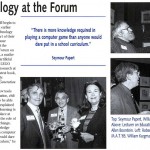A link to my unofficial BU Academy Technology blog… and further thoughts about my educational technology pedagogy, and work this semester.
Having worked professionally in the software development arena for 10 years and with an additional decade of K-12 teaching and academic IT experience, I am a “constructivist.”
I believe in empowering students, faculty and staff with technological tools for critical thinking and creativity. I was fortunate enough to meet and have a conversation with Seymour Paypert while at graduate school – this led directly to my teaching of robotics at BB&N. His book “Mind Storms” had a profound impact on my philosophy.
One last item I think is interesting…what is the first part of the Sunday New York Times that you read? I always read page two of the business section. The interviews are fascinating.

